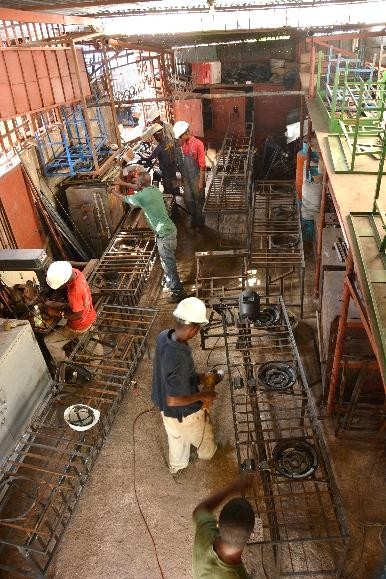
Feb. 2015—Switching from cooking with charcoal to propane—a cleaner and less expensive method, is reaping big rewards in Haiti for business owners, their customers, the environment and the economy.
Serge Jean Baptiste, a civil engineer student and mechanical technician, established his metal works business in 2003 to fabricate iron gates and roof frames for houses. He first entered the cooking technology business by making covers for the “Bip Ti Cherie,” a small gas camping stove. He then transitioned to making kerosene stoves, and finally started to manufacture propane stoves.
But his capacity for production of the stoves was very limited. This changed, however, in 2012 when USAID's Improved Cooking Technology Program provided his business, and 11 others, with grants to improve their organizational capacity and production of commercial propane stoves.
Baptiste received materials, tools and equipment valued at more than $10,000 as well as technical assistance and training on the efficient production of stoves. Quality improved and production costs went down, so the stove became more affordable. With USAID’s support, his business is now booming.
“While it is true that I have been in this line of work for more than 10 years, I must confess that, during the last 18 months, I have experienced a significant growth in the production capacity of my business and a significant increase in demand,” said Baptiste. “Thanks to the program’s various promotional activities such as fairs, cooking demonstrations, and the radio awareness and education campaign, my enterprise has become a popular and flourishing business.”
Since working with the USAID program, Baptiste’s staff has grown from six to 10 employees. Each month he receives a report on the requirements for production.
“Today, I see myself as a leader and a manager who successfully organizes his work with a better vision for the future of his business,” he said.
Petion*, who has been in the restaurant business for more than 10 years, is one of Baptiste’s hundreds of satisfied clients who have converted from charcoal to propane stoves. Petion manages his restaurant, Take Out Bar Resto, in Petion-Ville with his wife, who serves as the head cook.
Petion says he used about $14 (650 Haitian gourdes) worth of charcoal each day before he converted his kitchen to cleaner cooking technology using propane five months ago. He is thrilled with how much money he has saved.
“Today, with a 100-pound container of liquefied propane gas that costs around 2,500 gourdes, I can cook for 10 days. This has saved us about 400 gourdes a day!” said Petion.
He was also happy about the other advantages of using propane stoves in his restaurant, such as improved health conditions for his wife, cleanliness in their kitchen, faster cooking, and the environmental benefits of the cleaner technology.
“The money saved from converting from charcoal to propane can be invested in production in order to increase wealth,” added Baptiste, smiling, taking pride in contributing to the protection of his country’s natural resources and improving the lives of his countrymen and women.
The Improved Cooking Technology Program, which ran from January 2012 to January 2015, was designed to help Haiti develop cleaner, more cost-efficient cooking methods to limit air pollution and deforestation.
*Full name not available.
LINKS
Follow @USAIDHaiti, on Facebook, on Flickr







Comment
Make a general inquiry or suggest an improvement.